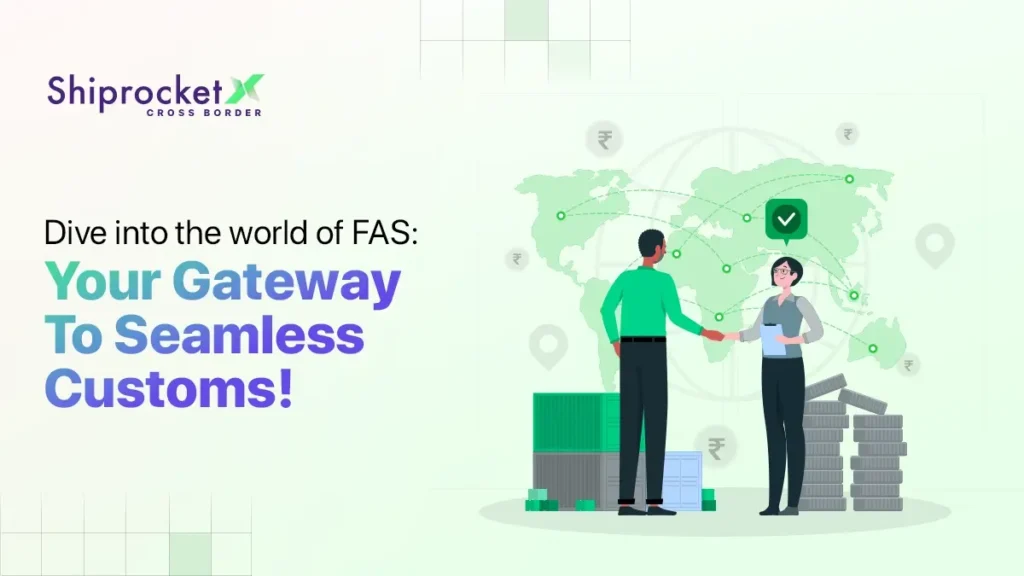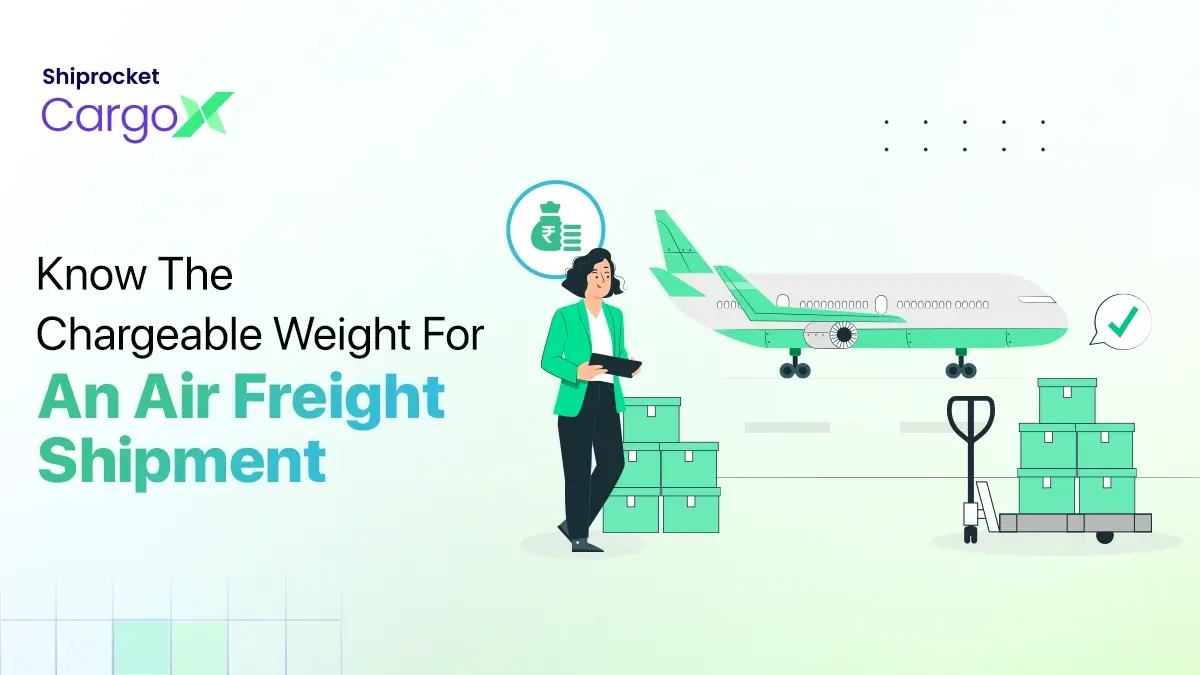FAS Incoterm: Streamlining Customs Compliance
- Free Alongside Ship (FAS) Incoterm 2020: Definition and Related Terms
- Understanding Customs: What Does FAS Signify?
- Conditions of Free Alongside Ship (FAS)
- Advantages of FAS Incoterm
- Incorporating Free Alongside Ship (FAS) in Contracts
- Exporter’s Responsibilities under FAS Incoterm
- Importer’s Duties under FAS Incoterm
- Expand Your Global Reach with Shiprocket X
- Conclusion
The International Chamber of Commerce (ICC) plays a crucial role in global trade by creating a set of Incoterms, officially known as international commercial terms. These terms are like a rulebook that helps avoid confusing contracts between buyers and sellers from different countries. People in both local and international trade often use Incoterms as a shortcut to understand precisely what they need to do in their business deals. Some Incoterms work for moving things, while others are just for carrying items on the water. One such term is FAS (Free Alongside Ship), and it helps everyone involved in the trade understand what needs to happen when goods are placed next to a ship for export.

Free Alongside Ship (FAS) Incoterm 2020: Definition and Related Terms
In international trade, when you encounter the term “Free Alongside Ship” (FAS) under the Incoterms 2020, it means that as the seller, you are responsible for clearing the goods for export. Your job is to deliver the goods to a specific port and place them beside the buyer’s designated vessel. This Incoterm is one of several globally recognized terms in international business for smooth communication between buyers and sellers.
The Incoterms 2020, the current version in use, includes 11 regulations covering all modes of transport. It has 7 rules that cover all the modes of transport and 4 that are specific to transporting cargo over water. These Incoterms rules are as follows:
EXW – Ex Works (showing the place of delivery)
FCA – Free Carrier (showing the place of delivery)
CPT – Carriage Paid To (showing destination)
CIP – Carriage and Insurance Paid To (showing destination)
DAP – Delivered at Place (showing destination); replaces Delivered Duty Unpaid or DDU.
DPU – Delivered at Place Unloaded (showing destination); replaces Delivery at Terminal or DAT.
DDP – Delivered Duty Paid (showing destination)
The Incoterms that are specific to water transport are the following:
FAS – Free Alongside Ship (port of loading has to be mentioned)
FOB – Free on Board (port of loading to be mentioned)
CFR – Cost and Freight (show port of discharge)
CIF – Cost Insurance and Freight (port of discharge to be shown)
Understanding Customs: What Does FAS Signify?
FAS, or Free Alongside Ship, represents an agreement between a buyer and a seller regarding the delivery of goods in international trade. This Incoterm precisely outlines each party’s responsibilities during the delivery process. In the context of FAS, the seller delivers goods to a specified port for transaction transparency.
FAS features a distinct point where the risk shifts from the seller to the buyer when the goods are placed alongside the ship. This moment is crucial for effective risk management and clarifies each party’s obligations.
Operating within standardized Incoterms, FAS facilitates international trade by establishing a common understanding among trading partners about the tasks, costs, and risks of delivering goods. FAS contributes to a more efficient and standardized global trade landscape.
Conditions of Free Alongside Ship (FAS)
When dealing with FAS, it’s essential to understand that the exporter must deliver the goods, along with commercial invoices and any additional proof of conformity outlined in the contract, like an analysis certificate or weighbridge document. These documents can be either in paper or electronic form, based on what’s agreed upon in the contract.
On the agreed-upon day and time, the exporter must place the goods near the vessel provided by the importer. How the goods are delivered depends on the nature of the products and the customs regulations at the port. The exporter is not tasked with arranging for the carriage or transportation of the goods.
FAS is designed explicitly for ocean or inland waterway transport and is particularly popular for bulk cargo like oil or grain. It’s important to know that FAS is unsuitable for containerized shipments delivered solely to a terminal. In such cases, the appropriate Incoterm would be FCA (Free Carrier). This distinction ensures clarity and adherence to the specific conditions of each Incoterm.
Advantages of FAS Incoterm
The FAS Incoterm offers distinct advantages to both sellers and buyers in international trade:
- Simplified Seller Responsibility: One of the primary benefits for sellers under FAS is the simplicity of their responsibilities. The seller’s obligation concludes once the goods are placed alongside the named vessel, streamlining their role in the transaction.
- Buyer Control and Responsibility: FAS gives buyers significant control over the process. The buyer takes charge when the goods are delivered alongside their designated shipping vessel. However, it’s essential to note that the buyer assumes responsibility for ensuring their vessel is equipped for loading and covers associated loading costs.
- Reduced Risk and Expenses for the Seller: FAS minimizes the risk and expenses borne by the seller. After unloading the goods close to the expected vessel, the exporter shifts risks and costs to the importer, who becomes responsible for transporting the goods to the final destination.
- Cost Savings for the Importer: Importers benefit from FAS as they are not required to spend on transporting products to their location. This cost-saving aspect allows exporters engaged in international trade to optimize their business investment. This further potentially increases the total invoice value of their goods.
- Limited Responsibility for Product Protection: Once goods are positioned close to the vessel, the exporter’s responsibility ends. The products are then at the importer’s disposal for continued transportation, reducing the exporter’s burden in protecting the goods during the subsequent journey stages under FAS delivery standards.
Incorporating Free Alongside Ship (FAS) in Contracts
Integrating Free Alongside Ship (FAS) into international trade contracts means that the goods will be delivered next to the buyer’s ship, ready for reloading. FAS is an incoterm, a set of rules established by the International Chamber of Commerce to govern global transactions.
Incoterms, including FAS, provide:
- A framework for sellers and buyers
- Specifying responsibilities such as insurance
- Customs clearance
- Shipment management
By including FAS in contracts, both parties gain clarity on their roles. Contracts for international transportation detail crucial aspects like delivery time and place, payment terms, and cost allocation for freight and insurance. The contract also designates the point at which the risk of loss shifts from the seller to the buyer. This clear delineation ensures transparency and minimizes potential disputes throughout the transaction.
Exporter’s Responsibilities under FAS Incoterm
Under the Free Alongside Ship (FAS) Incoterm, the seller assumes specific obligations to facilitate a smooth international trade transaction. The key responsibilities of the exporter (seller) include:
- Goods, Commercial Invoice, and Documentation: Furnish specified goods, a meticulously detailed commercial invoice, and all necessary documentation to facilitate a smooth export process.
- Export Packaging and Marking: Ensure the proper packaging and labelling of goods to meet international standards, safeguarding them during transit.
- Export Licences and Customs Formalities: Obtain essential export licences and proficiently handle customs procedures to adhere to regulatory requirements.
- Pre-Carriage to Terminal: Arrange and cover the costs of transporting goods to the designated terminal or port, ensuring a seamless transition.
- Delivery Alongside Vessel at Port of Shipment: Deliver goods efficiently by placing them alongside the buyer’s nominated vessel at the agreed port of shipment, adhering to the agreed-upon terms.
- Proof of Delivery: Provide irrefutable evidence that goods have been delivered as per the mutually agreed-upon terms, fostering transparency in the transaction.
- Cost of Pre-Shipment Inspection: Bear the costs linked to any required pre-shipment inspection, demonstrating a commitment to quality and compliance in international trade.
Importer’s Duties under FAS Incoterm
The buyer’s obligations under FAS encompass various stages of the shipping process, from loading at the port of departure to the final delivery at the destination. Understanding and fulfilling these duties is essential for a seamless and efficient import process under the FAS Incoterm. The importer’s Duties under FAS Incoterm are as follows:
- Payment Obligations: The buyer is responsible for paying the mutually agreed-upon price for the goods stipulated in the sales contract, ensuring financial commitment to the transaction.
- Loading Charges: Incur the costs associated with loading the goods onto the designated vessel, ensuring a secure and proper loading process.
- Main Carriage: Take charge of organizing and managing the transportation of goods from the port of departure to the final destination, overseeing the main carriage for the seamless cargo movement.
- Discharge and Onward Carriage: Manage discharge procedures at the destination port and arrange for the onward carriage of goods from the port to the final destination. Thus, ensuring a smooth transition throughout the logistics chain.
- Import Formalities and Duties: Undertake all necessary import formalities, ensuring strict compliance with local regulations. Also, cover any associated import duties to facilitate a compliant entry of the goods into the destination country.
- Cost of Pre-Shipment Inspection (for Import Clearance): If a pre-shipment inspection is deemed necessary, the buyer is responsible for covering the associated expenses. This ensures adherence to quality and regulatory standards during the import clearance process.
Expand Your Global Reach with Shiprocket X
Integrate Shiprocket X into your international contracts for streamlined shipping. With over 11 years of logistics expertise, Shiprocket X, a product of Shiprocket trusted by 2.5 lakh Indian sellers, offers a seamless blend of technology and services. Simplify international shipping with end-to-end cross-border solutions and expand your global footprint. Benefit from Shiprocket X’s daily handling of 2.2 lakh shipments, providing a reliable choice for growth. Its transparent B2B deliveries managed enablement solutions, and simplified logistics make it ideal for businesses seeking global expansion. Access multiple shipping modes, hassle-free customs clearance, and automated workflows, ensuring efficient international delivery. Shiprocket X provides real-time updates, insightful analytics, a widespread courier network, and comprehensive solutions for streamlined global logistics.
Conclusion
Incoterms serve as valuable tools in international trade, offering clarity by categorizing responsibilities between buyers and sellers based on transportation modes. The FAS Incoterm is suitable for buyers with the infrastructure to handle goods from the departure port to the destination. The seller’s responsibility ends once the goods are alongside the ship, and they manage export customs formalities. Yet, it may not be apt for special handling or specific destinations. In such cases, CIF or FOB Incoterms are more fitting alternatives. Understanding these nuances ensures a smoother and well-defined international trade process.
FAS is suitable for various goods, especially those not requiring special handling or specific packing. However, it may not be ideal for goods with unique shipping needs.
CIF or FOB may be preferred over FAS for goods requiring special handling, specific destinations, or when buyers want the goods shipped directly to a specific location.
FAS relieves the seller from additional costs or risks once goods are placed alongside the ship. Buyers, however, bear costs associated with loading, local carriage, discharge, import formalities, and onward carriage.





